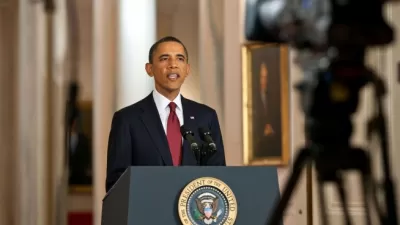After a long confirmation delay, Gina McCarthy, the new head of the U.S. Environmental Protections Agency, has wasted little time wading into the controversy over the agency's (and administration's) role in addressing climate change.
"The new head of the Environmental Protection Agency told an audience at Harvard Law School on Tuesday that cutting carbon pollution will 'feed the economic agenda of this country' and vowed to work with industry leaders on shaping policies aimed at curbing global warming," reports Juliet Eilperin. "McCarthy made a full-throated defense of her agency’s right to address greenhouse-gas emissions and other pollutants, saying that air-quality regulations and environmental cleanup efforts have already produced economic benefits in the United States."
“Can we stop talking about environmental regulations killing jobs, please?” she asked, prompting loud applause. “We need to embrace cutting-edge technology as a way to spark business innovation.”
"[McCarthy] said climate change was now the top priority for the agency," adds Eilperin, "which plans to model its efforts on the administration’s earlier agreement with the auto industry on stricter fuel efficiency standards for cars and light trucks."
FULL STORY: As new EPA chief, Gina McCarthy vows to act on climate change

Manufactured Crisis: Losing the Nation’s Largest Source of Unsubsidized Affordable Housing
Manufactured housing communities have long been an affordable housing option for millions of people living in the U.S., but that affordability is disappearing rapidly. How did we get here?

Americans May Be Stuck — But Why?
Americans are moving a lot less than they once did, and that is a problem. While Yoni Applebaum, in his highly-publicized article Stuck, gets the reasons badly wrong, it's still important to ask: why are we moving so much less than before?

Using Old Oil and Gas Wells for Green Energy Storage
Penn State researchers have found that repurposing abandoned oil and gas wells for geothermal-assisted compressed-air energy storage can boost efficiency, reduce environmental risks, and support clean energy and job transitions.

Greening Oakland’s School Grounds
With help from community partners like the Trust for Public Land, Oakland Unified School District is turning barren, asphalt-covered schoolyards into vibrant, green spaces that support outdoor learning, play, and student well-being.

California Governor Suspends CEQA Reviews for Utilities in Fire Areas
Utility restoration efforts in areas affected by the January wildfires in Los Angeles will be exempt from environmental regulations to speed up the rebuilding of essential infrastructure.

Native American Communities Prepare to Lead on Environmental Stewardship
In the face of federal threats to public lands and conservation efforts, indigenous groups continue to model nature-centered conservation efforts.
Urban Design for Planners 1: Software Tools
This six-course series explores essential urban design concepts using open source software and equips planners with the tools they need to participate fully in the urban design process.
Planning for Universal Design
Learn the tools for implementing Universal Design in planning regulations.
Heyer Gruel & Associates PA
City of Moreno Valley
Institute for Housing and Urban Development Studies (IHS)
City of Grandview
Harvard GSD Executive Education
Salt Lake City
NYU Wagner Graduate School of Public Service
City of Cambridge, Maryland




























